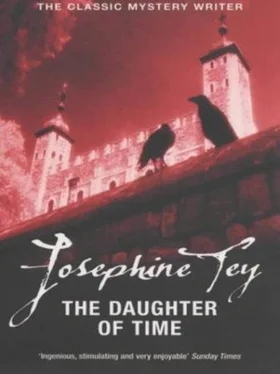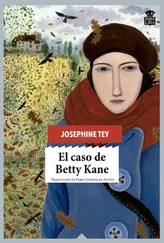He looked at Marta and found that she was smiling.
‘Are they a little better now?’ she asked. ‘Are what better?’
‘The prickles.’
He laughed.
‘Yes. For a whole minute I had forgotten about them. That is at least one good thing to be put down to Mary Stuart’s account!’
‘How do you know so much about Mary?’
‘I did an essay about her in my last year at school.’
‘And didn’t like her, I take it.’
‘Didn’t like what I found out about her.’
‘You don’t think her tragic, then.’
‘Oh, yes, very. But not tragic in any of the ways that popular belief makes her tragic. Her tragedy was that she was born a Queen with the outlook of a suburban housewife. Scoring off Mrs Tudor in the next street is harmless and amusing; it may lead you into unwarrantable indulgence in hire-purchase, but it affects only yourself. When you use the same technique on kingdoms the result is disastrous. If you are willing to put a country of ten million people in pawn in order to score off a royal rival, then you end by being a friendless failure.’ He lay thinking about it for a little. ‘She would have been a wild success as a mistress at a girls’ school.’
‘Beast!’
‘I meant it nicely. The staff would have liked her, and all the little girls would have adored her. That is what I meant about her being tragic.’
‘Ah well. No casket letters, it seems. What else is there? The Man In The Iron Mask.’
‘I can’t remember who that was, but I couldn’t be interested in anyone who was being coy behind some tinplate. I couldn’t be interested in anyone at all unless I could see his face.’
‘Ah, yes. I forgot your passion for faces. The Borgias had wonderful faces. I should think they would provide a little mystery or two for you to dabble in if you looked them up. Or there was Perkin Warbeck, of course. Imposture is always fascinating. Was he or wasn’t he. A lovely game. The balance can never come down wholly on one side or the other. You push it over and up it comes again, like one of those weighted toys.’
The door opened and Mrs Tinker’s homely face appeared in the aperture surmounted by her still more homely and historic hat. Mrs Tinker had worn the same hat since first she began to ‘do’ for Grant, and he could not imagine her in any other. That she did possess another one he knew, because it went with something that she referred to as ‘me blue’. Her ‘blue’ was an occasional affair, in both senses, and never appeared at 19 Tenby Court. It was worn with a ritualistic awareness, and having been worn it was used in the event as a yardstick by which to judge the proceedings. (‘Did you enjoy it, Tink? What was it like?’ ‘Not worth putting on me blue for.’) She had worn it to Princess Elizabeth’s wedding, and to various other royal functions, and had indeed figured in it for two flashing seconds in a newsreel shot of the Duchess of Kent cutting a ribbon, but to Grant it was a mere report; a criterion of the social worth of an occasion. A thing was or was not worth putting on ‘me blue’ for.
‘I ’eard you ‘ad a visitor,’ said Mrs Tinker, ‘and I was all set to go away again when I thought the voice sounded familiar like, and I says to meself: “It’s only Miss Hallard,” I says, so I come in.’
She was carrying various paper bags and a small tight bunch of anemones. She greeted Marta as woman to woman, having been in her time a dresser and having therefore no exaggerated reverence for the goddesses of the theatre world, and looked askance at the beautiful arrangement of lilac sprays that had blossomed under Marta’s ministrations. Marta did not see the glance but she saw the little bunch of anemones and took over the situation as if it were something already rehearsed.
‘I squander my vagabond’s hire on white lilac for you, and then Mrs Tinker puts my nose out of joint by bringing you the Lilies Of The Field.’
‘Lilies?’ said Mrs Tinker, doubtfully.
‘Those are the Solomon in all his glory things. The ones that toiled not neither did they spin.’
Mrs Tinker went to church only for weddings and christenings, but she belonged to a generation that had been sent to Sunday school. She looked with a new interest at the little handful of glory incased by her woollen glove.
‘Well, now. I never knew that. Makes more sense that way, don’t it. I always pictured them arums. Fields and fields of arums. Awful expensive, you know, but a bit depressing. So they was coloured? Well, why can’t they say so? What do they have to call them lilies for!’
And they went on to talk about translation, and how misleading Holy Writ could be (‘I always wondered what bread on the waters was’, Mrs Tinker said) and the awkward moment was over.
While they were still busy with the Bible, The Midget came in with extra flower vases. Grant noticed that the vases were designed to hold white lilac and not anemones. They were tribute to Marta; a passport to further communing. But Marta never bothered about women unless she had an immediate use for them; her tact with Mrs Tinker had been mere savoir faire ; a conditioned reflex. So The Midget was reduced to being functional instead of social. She collected the discarded narcissi from the washbasin and meekly put them back into a vase. The Midget being meek was the most beautiful sight that had gladdened Grant’s eyes for a long time.
‘Well,’ Marta said, having finished her arrangement of the lilac and placed the result where he could see it, ‘I shall leave Mrs Tinker to feed you all the titbits out of those paper bags. It couldn’t be, could it, Mrs Tinker darling, that one of those bags contains any of your wonderful bachelor’s buttons?’
Mrs Tinker glowed.
‘You’d like one or two maybe? Fresh outa me oven?’
‘Well, of course I shall have to do penance for it afterwards those little rich cakes are death on the waist but just give me a couple to put in my bag for my tea at the theatre.’
She chose two with a flattering deliberation (‘I like them a little brown at the edges’), dropped them into her handbag, and said: ‘Well, au revoir, Alan. I shall look in, in a day or two, and start you on a sock. There is nothing so soothing, I understand, as knitting. Isn’t that so, nurse?’
‘Oh, yes. Yes, indeed. A lot of my gentlemen patients take to knitting. They find it whiles away the time very nicely.’
Marta blew him a kiss from the door and was gone, followed by the respectful Midget.
‘I’d be surprised if that hussy is any better than she ought to be,’ Mrs Tinker said, beginning to open the paper bags. She was not referring to Marta.
But when Marta came back two days later it was not with knitting needles and wool. She breezed in, very dashing in a Cossack hat worn at a casual rake that must have taken her several minutes at her mirror, just after lunch.
‘I haven’t come to stay, my dear. I’m on my way to the theatre. It’s matinée day, God help me. Tea trays and morons. And we’ve all got to the frightful stage when the lines have ceased to have any meaning at all for us. I don’t think this play is ever coming off. It’s going to be like those New York ones that run by the decade instead of by the year. It’s too frightening. One’s mind just won’t stay on the thing. Geoffrey dried up in the middle of the second act last night. His eyes nearly popped out of his head. I thought for a moment he was having a stroke. He said afterwards that he had no recollection of anything that happened between his entrance and the point where he came to and found himself half-way through the act.’
‘A black-out, you mean?’
‘No. Oh, no. Just being an automaton. Saying the lines and doing the business and thinking of something else all the time.’
Читать дальше












